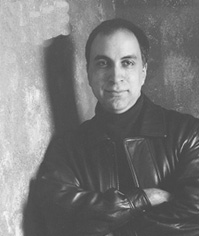
Composer Anthony Cornicello (born in Brooklyn, New York, 1964) writes music that blurs distinctions between performers and electronics, timbre and harmony, composition and improvisation, and explores the boundaries of what may be considered post-classical concert music. His music is vibrant and visceral, full of rhythmic energy and harmonic sophistication, and his forays into live electronics have led to exciting combinations of instruments and processed sound. Cornicello’s background as a jazz pianist is evident not only in the rhythmic activity of his music, but also in his constant investigation of the rich sonorities available from a variety of instruments.
He has been commissioned to write music for the Scorchio Electric String Quartet, ModernWorks! (funding from Meet the Composer/ Commissioning Music USA), the Auros Group for New Music, the Prism Saxophone Quartet, the New York New Music Ensemble, David Holzman, the Group for Contemporary Music, and the InterEnsemble of Padova, Italy. His work has also been featured on the Guggenheim Museum’s “Works and Process” series. Cornicello’s works have also been performed by the Chicago Civic Symphony, Parnassus, ALEA III, Composers Concordance, Madeleine Shapiro, Robert Black, among many other outstanding groups and solo performers. His music has been presented as part of the Darmstadt International Festival of New Music as well as the June in Buffalo Festival.
Cornicello’s Second String Quartet has been recorded by the Atlantic String Quartet; the Second Sonata for Piano by David Holzman (Centaur). More recently, his Post-Modern Waltz was recorded by Eric Moe for Albany Records. A portrait CD of Cornicello’s works is scheduled for 2006 release on Albany Records.
As a performer, he has conducted or played piano in his own works on numerous occasions. While a graduate student at Rutgers, he formed and directed the Janus Ensemble, a group dedicated to contemporary music. More recently, Cornicello has begun performing on the laptop, using a variety of interfaces and the Max/MSP program. Those performances, mostly with EEE!, have had a notable impact on his music, as EEE!’s music ranges from hip-hop to experimental noise. EEE! is based at Eastern Connecticut State University, where Cornicello is an Associate Professor and Director of the Electronic Music Lab.
Cornicello received the Ph.D. from Brandeis University, where he studied with David Rakowski, Eric Chasalow, and Martin Boykan. His teachers also include Charles Wuorinen, Gérard Grisey, and Richard Beirach.
His current fields of interest include developing unusual interfaces for live computer music performances, as well as continuing to investigate resonance and spatialization. His recent and current projects (mostly for string instruments and electronics) have been exploring the latter two, and the series of experimental works ReZenant Garden, performed by EEE! have operated on all three areas of interest. Future projects will include works for instrumental groups or soloists and electronics, as well as turntablists.
Cornicello's works are published by C.F. Peters Corporation and APNM, and he is a member of BMI.
|
|
|
|
|
|

Sunday, November 18, 2007
A good Max/MSP Sampler?
Okay fellow Max/MSP geeks:
Does anyone know of a good Max/MSP sampler? At one point, there was samplor~, which did everything you'd expect from a sampler. It allowed you to set the 'home' key, range, loop points, etc. It was stable. Then, when Max/MSP converted to version 4.X, it was apparently never updated. So now, when you go to load it up into a new patch, you get the "fragload" error. This is more than a little disturbing, since I have an older piece that uses this module.
IMPORTANT: if anyone has a more recent version of this patch that works in the current version of Max (I'm up to 4.6), you will have my eternal gratitude.
Then there's Najo. It seems like a good idea, except that it CONSTANTLY CRASHES. Sometimes, it crashes when you start it up; sometimes, when you're just looking at it. Most often, it crashes when you try to save or upload a preset. Now, call me silly, but I think that saving and accessing files are basic functions that any program should be able to do flawlessly.
I've been hacking away at Najo (the most recent version, 1.3.3, as well as an earlier 1.0b version), for about two weeks now. And, I've read through the manual as best I can (it's in French). I've read and re-read the part about installation. And, it doesn't say things like "don't try to save anything, because it's gonna crash like a drunk on roller skates!"
Does anyone knows the magic incantation to make Najo behave?
Better, are there any other options? I have samp~, but it falls a little short - no looping, for instance. Of course, I guess I could sit down and try to create my own, but I'd rather not re-invent the wheel.
Thanks!Labels: electronic music, Max, Max/MSP
posted by Anthony Cornicello
|
| |



